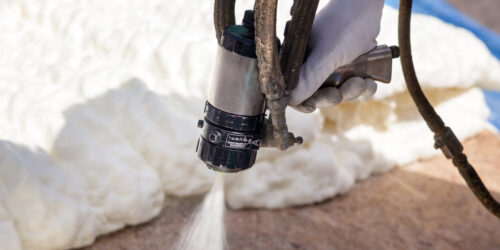Why Consider Spray Foam Insulation in Roofs?
- Best type of insulation for your roof
- More than twice as efficient as traditional insulation
- Lowers energy bills, protects against environmental noise and cuts carbon emissions
The place in any property where the most heat is lost, installing spray foam roof insulation is the best way to ensure insulation of your home is effective.
As the best type of insulation available, roofs are understandably the most popular place spray foam insulation is installed. According to Energy Saving Trust, it’s possible to lose up to 25% of the heat you generate through your roof so prevent heating escaping from the very top of your property is key for energy efficiency.
Delivering the most air-tight seal which lasts for over 30 years and is environmentally friendly, spray foam roof insulation can cut your energy bills and personal carbon consumption because it will take less energy to keep your home warm.
Let’s explore the following frequently asked questions about spray foam roof insulation. From where spray foam will go inside your roof to the advantages and disadvantages and what it is, here’s all you need to know to help you decide whether spray foam roof insulation will be right for you.
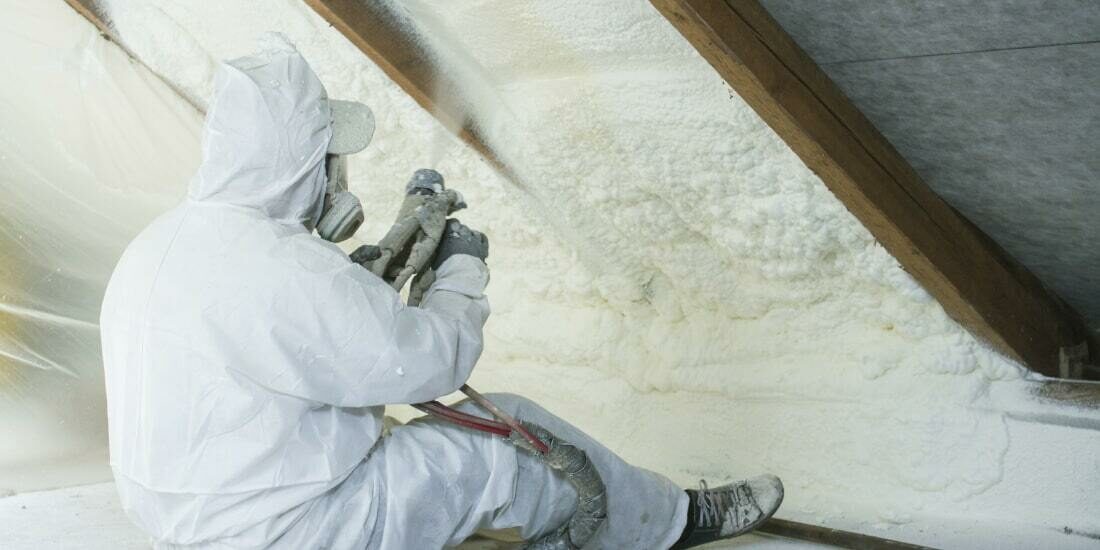
What's On This Page?
Click the links below and head straight to a specific section of the article.
What Is Spray Foam Roof Insulation?
Made from liquid plastic called polyurethane, spray foam insulation expands to up to 100 times its original size as it reaches the point of installation. Rapid expansion occurs as the result of the meeting of polymers and urethane bonds as they are pushed out of the spray gun.
Manufactured for a wide range of purposes since the 1930s, polyurethane is a safe and reliable substance that’s also environmentally safe.
Hardening as it cools, polyurethane’s wide range of beneficial properties include resistance to heat and weather. It can also resist water and sound to varying degrees, depending on the structure of its bubbly composition, determined by your professional installer according to the type of foam you need for your home.
Setting as a hard cloud of foam as it cools, spray foam insulation fits neatly into any space and is suitable for: roofs, walls, floors, lofts and attics.
To learn about the best loft insulation read our complete guide.
Where in the Roof Is Spray Foam Insulation Installed?
Spray foam insulation needs to be installed in an open area which it will expand to fill. When installed in roofs, spray foam roof insulation is most commonly placed in the rafters or joists. Filling what was a cavity, your roof and in fact, structure of your home will be stronger as the result of insulation because it is completely filling a gap.
You can read more about spray foam insulation installation.
Which Is the Best Type of Spray Foam Insulation for Roofs?
There are two types of spray foam roof insulation which could be installed. Open cell spray foam insulation for roofs is a softer foam with larger bubbles which can trap sound for sound-proofing and allow water vapour to pass through.
Closed cell spray foam is a tighter construction offering greater protection against heat waste meaning water vapour is also prevented from leaving your home.
The retention or transport of water vapour is the biggest difference between the two and an important outcome which could spell disaster for installation. For this reason it’s really important you hire a professional spray foam insulation installer to install spray foam in your roof or anywhere in your property.
Read our guide to the differences between open cell and closed cell spray foam insulation to understand the benefits each type offers.
Advantages of Spray Foam Roof Insulation
Lower Energy Bills: Spray foam roof insulation is air-tight meaning you’ll benefit from a comfortable home year-round. In the winter, efficient energy use will lower your bills. In summer, if you have air con, there’s no danger of hot external air ruining your cool interior, enabling you to require less energy from your air conditioning.
Reliable Performance: Remaining in place for over 30 years, spray foam roof insulation will continue to perform long into the future without further maintenance.
Already in use across the manufacturing industry, it’s a reliable material with proven results - essential for installation in a critical place, largely left unseen, unless there’s a problem.
Supports the environment: Energy efficiency means you’ll use less energy thereby lowering your carbon consumption with the installation of spray foam which is also environmentally friendly.
Sound-proofing: Quiet homes are essential to our wellbeing. Whether you want to insulate against noise from certain rooms in your home or external noise, spray foam roof insulation can also deliver sound-proofing.
Open cell spray foam roof insulation delivers the best sound-proofing but you’ll need to have a survey carried out by a professional installer to determine which type of spray foam roof insulation will best suit your home.
Greater property value: An energy efficient home with updated, high-performing spray foam roof insulation will of course, be a major draw for buyers. Remember to keep your warranty somewhere safe so you can evidence insulation when selling your home in future.
Financial help: The Energy Company Obligation Scheme (ECO) is available to assist with insulation costs. Run by the UK’s energy providers, the ECO scheme has a remit to support the implementation of energy efficient improvements to homes.
The scheme does tend to narrow qualification to families with low incomes or vulnerable family members but it’s worth a try. Read more about financial support for insulation in our guide to loft insulation costs.
Disadvantages of Spray Foam Roof Insulation
There is only one true disadvantage to installing spray foam insulation in your roof and that is easily avoided by leaving installation to an experienced professional who will ensure your spray foam is installed correctly.
Condensation and Water Problems: If you try to install spray foam yourself or use the wrong type of spray foam insulation for your roof, one of the biggest risks is the serious damage condensation or water collection can cause.
If installed in the wrong environment where ventilation inadequate, closed cell spray foam can lead to issues with condensation or water build up from things like leaks.
Before your spray foam roof insulation is put in place, your spray foam roof insulation installer should conduct a comprehensive survey of your home and advise you which type of spray foam will be best for your property.
Without the initial survey you run a serious risk of causing lasting damage to the structure of your home due to the prominent places where the spray foam will be located. Water, damp and wood do not go together and rotting structural joints are certainly not what you want.
Leave installation to a qualified, BBA-approved (British Board of Agrément) installer and make sure they are insured and your work comes with a warranty
More expensive than traditional insulation: The other disadvantage of spray foam roof insulation is that your insulation costs will be higher than those incurred from traditional roof insulation.
However, spray foam roof insulation is a far more superior, long-lasting product than traditional methods. Spray foam insulation doesn’t require maintenance and lasts for over 30 years. At around £20 – 50 per square metre spray foam is well worth the financial investment. It which could set you back around £2500 for an average 3-bed semi-detached house but it’s a one-off job you won’t need to do again.
Learn more about what spray foam roof installation involves, hiring a good installer and how you’ll know which is the best type of spray foam for your home, read our spray foam insulation installers guide.
How Good Is Spray Foam Roof Insulation?
The best evidence for comparison of the performance of spray foam insulation is to see how its R-value, a measure of heat resistance, compares to other insulation products. Take a look at the comparison table below and you’ll see spray foam insulation outperforms the alternatives with an R value of between 3 and 7.
R value comparison for various types of insulation: how good is spray foam roof insulation?
Get a tailored quote for installation from us in minutes. Find the best, certified spray foam installers near you for peace of mind today.
Related articles
View all Insulation articles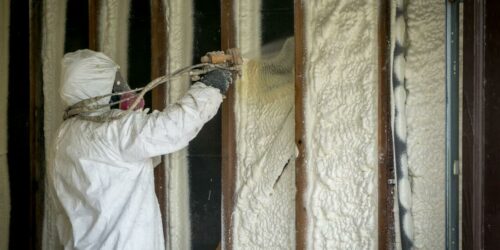
How Long Does Spray Foam Insulation Last?
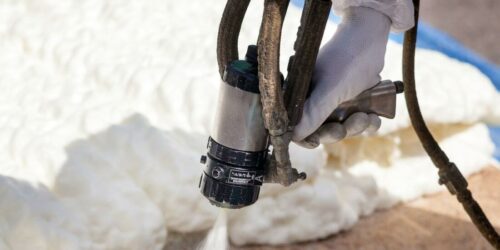
Can I Install DIY Spray Foam Insulation Myself?
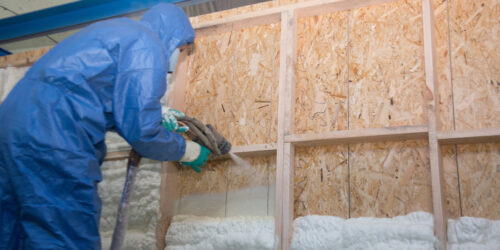
Six Benefits of Spray Foam Insulation
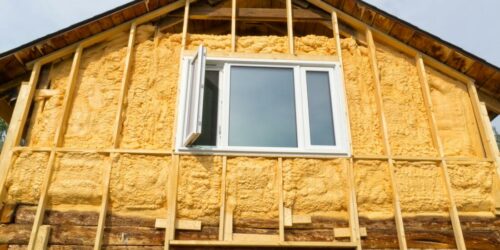
Is My Property Suitable for Spray-On Insulation Foam?
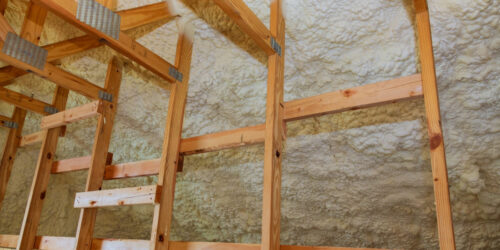
Icynene Spray Foam Insulation: A Complete Guide
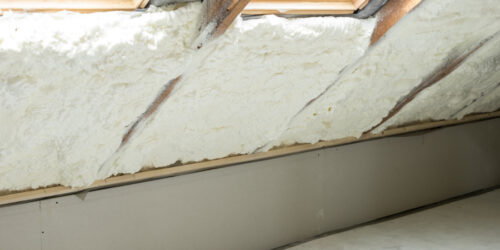
Spray Foam Insulation Installers: What to Expect
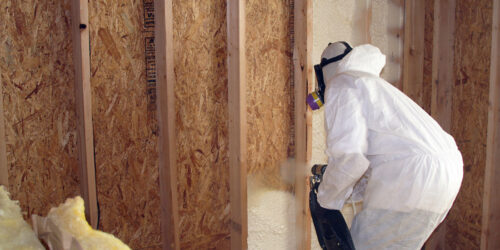
Open Cell vs Closed Cell Spray Foam Insulation: What’s The Difference?
